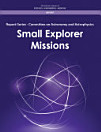Federal Funding of Astronomical Research
National Research Council · Commission on Physical Sciences, Mathematics, and Applications · Space Studies Board · Board on Physics and Astronomy · Committee on Astronomy and Astrophysics
জানু ২০০০ · National Academies Press
ই-বুক
98
পৃষ্ঠা
reportরেটিং ও রিভিউ যাচাই করা হয়নি আরও জানুন
এই ই-বুকের বিষয়ে
The Committee on Astronomy and Astrophysics (CAA), at its meeting on September 8, 1997, was briefed on the legislative report accompanying the bill to authorize appropriations for fiscal years 1998 and 1999 for the National Science Foundation (NSF). The report raised a number of questions about trends in support for research in astronomy and the overall robustness of the programs providing that support. At its meeting, the CAA heard the views of NSF and the National Aeronautics and Space Administration (NASA) on these issues. In consultation with the Board on Physics and Astronomy, the Space Studies Board, and representatives of NASA and NSF, the committee accepted the task of studying three of the questions raised by the House Science Committee (HSC). It was intended that the results of the study would help guide federal support of basic research for the next decade and serve as analytical input to the new 2000 decadal survey of the Astronomy and Astrophysics Survey Committee (AASC). The study would not offer specific funding recommendations, but rather would provide a background analysis of the alignment between available resources, agency priorities, and the vitality of the basic research program.
ই-বুকে রেটিং দিন
আপনার মতামত জানান।
পঠন তথ্য
স্মার্টফোন এবং ট্যাবলেট
Android এবং iPad/iPhone এর জন্য Google Play বই অ্যাপ ইনস্টল করুন। এটি আপনার অ্যাকাউন্টের সাথে অটোমেটিক সিঙ্ক হয় ও আপনি অনলাইন বা অফলাইন যাই থাকুন না কেন আপনাকে পড়তে দেয়।
ল্যাপটপ ও কম্পিউটার
Google Play থেকে কেনা অডিওবুক আপনি কম্পিউটারের ওয়েব ব্রাউজারে শুনতে পারেন।
eReader এবং অন্যান্য ডিভাইস
Kobo eReaders-এর মতো e-ink ডিভাইসে পড়তে, আপনাকে একটি ফাইল ডাউনলোড ও আপনার ডিভাইসে ট্রান্সফার করতে হবে। ব্যবহারকারীর উদ্দেশ্যে তৈরি সহায়তা কেন্দ্রতে দেওয়া নির্দেশাবলী অনুসরণ করে যেসব eReader-এ ফাইল পড়া যাবে সেখানে ট্রান্সফার করুন।






